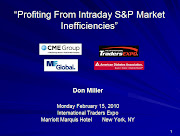 5:10pm For those new to the blog (more on that in a bit), I hate Mondays. Simply look at last year's stats by day of week. There's just something about restarting the engine after a break in market pace that I'll likely always struggle with, whether it be coming back from a weekend or still trying to get the 2009 engine up to full RPMs and running smoothly.
5:10pm For those new to the blog (more on that in a bit), I hate Mondays. Simply look at last year's stats by day of week. There's just something about restarting the engine after a break in market pace that I'll likely always struggle with, whether it be coming back from a weekend or still trying to get the 2009 engine up to full RPMs and running smoothly.Nevertheless, I suppose today was a modest success in that I learned from the morning refusal of the market to move strongly off its late morning 5-minute trend support -- which cost me much of the earlier morning gain -- and used the info to take the sure strong clip in the afternoon before regrouping for tomorrow.
I'd earlier passed on holding the initial morning pullback for anything more than a quick scalp as I don't typically hold a position when economic news is pending. Turned out that could have been the trade of the day as I looked for the next later morning bus -- which as mentioned above turned out to be a local vs. the express.
Yet I suppose it just takes that one trade to make the day, and today is now history and irrelevant.
A few housekeeping notes:
A reminder that the scorecard to the left reflects a fictitious prior-day draw column to keep my mind in lockstep with the drawdown concept.
If anyone printed a copy of the Chinese Bamboo Tree link from Eric Aronson that we referenced throughout '08 (the domain is no longer valid), please let me know via a comment and I'll likely have you email me a copy. It was a classic that I'd like to recreate for everyone, and I'll give Eric credit for the substance. [Note: opw provided the info after I posted this. I'll post a fresh link shortly. Thanks for the quick response opw!]
A continued welcome to all new "onlookers" as the web count spiked (yikes ... again!) over the weekend apparently as a result of the Jazz Trader post which was syndicated at MoneyShow.com and last week's interview with old friend Tim Bourquin. Let's see how we can continue to strengthen each other as we move forward and grow.

btw, I made my worst poker move ever in a charity tournament last night when I folded pocket 3s in first position (8 other bettors behind me) and the flop came 3-3-8. I just didn't think a call would hold up pre-flop given how aggressive everyone else had been up to that point, and didn't want to waste the initial capital. Turns out no one raised the pot and the call would have stood up. A pure Donkey move ... always call with a low pair and back off later if the pot gets raised.
It also proves I may need to loosen up both my poker and trading, as they tend to go hand in hand.
Have a pleasant evening.
















7 comments:
Don,
One of the bloggers at slopeofhope.com linked to an audio created by a CME trader, who discussed your 2008 results. He salutes you for your amazing year, but at the same time warned that it wouldn't be possible if you weren't able to take advantage of the very small commissions available to CME traders.
You know, after first visiting your site and hearing your interview, I thought well, there's hope for decent profits down the road! But the audio link makes me think that I would need reduced commissions, such as those for CME members.
What's your take on all this. Here's the link.
http://cm-videos.com/public%2520videos/01-2009/0117-09/0117-09.html
Hi Glen and thanks for the very insightful link of which I was not aware.
I'll touch on some of the comments over time (it's late here and I just checked the mail before heading to bed), but in the meantime here are a few immediate thoughts.
First, I thought his general commentary was very strong and he touched on several relevant points which mirror some of the things we've discussed here.
With respect to CME member rates benefiting me, there's no question about that, although we'd need to make one adjustment to the math as 8% of the total 637,766 contracts traded were related to Eurex that isn't related to CME membership and that I essentially considered continual "investment capital" in "learning" that market as I had a very small gross from it. The total CME # was actually 586,184.
However, even after adjusting the math, his point would remain relevant in that the savings in commission costs is a significant factor in generating the strong bottom line. No doubt about that as I'm often managing risk on speculative trades with scratches and re-entries while also providing liquidity at times which can quickly drive up trading volume.
I also agree that becoming a CME member doesn't guarantee success, and thought he was right on point there as well. One thought I'll add though is it doesn't take a huge trading volume to justify leasing a seat to get the lower costs. I currently pay $2,200/month, which based on an analysis I did some time ago, meant I had to "only" trade about 250 contracts a day to ensure the cost of the lease was covered by the savings in commissions over time. [When I become a member in early '04, I actually tracked my monthly volumes carefully for a while to ensure the lease was always justified.]
And yes, 250 can still be considered high for many, although it's only about 10% of my 2008 volume ... meaning one doesn't have to trade quite as frequently or with as much size to still benefit from the reduced rates.
So justifying a lease could be more within reach for some than at first blush, although as he mentions, it's certainly no replacement for needing to acquire the skill aspect of the profession.
Yet the commission point remains relevant and I would make an analogy to running a store where cost control is paramount in generating the strongest margins. Ensuring one pays wholesale costs and overall cost control are critical.
One last thought on the commission issue is that the more both retail and wholesale traders push for reduced broker costs (the non-CME component of the fee), the more we'll hopefully see continued reductions in industry commission costs for both types of traders. And yes, we do have a voice with our wallets and choice of brokers in a competitive broker marketplace. [Even when I was "retail", I was able to pursue lower fees, although certainly higher volumes provide a stronger negotiating position.] Yet again, this thought addresses the non-CME part of the rate as the CME piece is set by the Merc.
A few other responses to what I again thought was an overall solid audio:
Prior teaching & products - Yes, as many know I used to teach and at one time wrote articles and developed simulation and other learning tools that were available at TradingMarkets [btw, my trading records over time have always been open to Larry Connors who had previously vouched for much of the "pre-blog" results]. I stopped doing so primarily to focus on my own trading. I believe the older material stock hasn't been replenished, and currently have no current plans to resurrect formal teaching. [Plus, I'm having a ball with the blog and I touch on many of the former concepts in my constant babbling here.]
His reinforcement that I currently have a supplemental non-trading income to pay bills is also of course true as we've discussed here. And yes, I'll continue to advocate that such income is a huge help in the mental pressure aspect, much like I imagine golf pros have sponsorships pay for their meals while they focus on executing and sharpening the skills of golf. Spousal income, part-time income, running other businesses are of course all options.
So does it help me mentally? Absolutely. Is it mandatory? Not at all as I've traded consistently successfully in the past when I was trading full-time and it was my sole income. It's of course hard to quantify how much reduced pressure impacts one's current bottom line -- including mine -- as it's an intangible concept.
So his points are again strong and reinforce much of what we've discussed here. A successful business requires both strong execution and cost management, which is true in the business of trading. [Perhaps that's where that costly MBA is finally paying off.]
I'll follow up more in a general post ... shut-eye time now.
Thanks again for the link.
Don
Yeah Don!
After re-reading your answers and now seeing you fold those 3’s up front, I came to the realization…I play the initial hands better in poker-as FEAR gripped me all day Monday.
And the funny thing is, its not even the money, even betting smaller/scaling in STILL doesn’t make a difference- My ego is getting in the way in the heat of the moment :(
Maybe one of those books you refer to will kick my brain straight…
I just started coming to your site a couple of days ago after following a link from Tim Knight's site. I am a total rookie at trading, but have made a little money with inverse etfs. Thinking about trading eminis like yourself. I play poker for a living out here in LA and just wanted to comment on your pocket 33's. Maybe you are being results oriented? In my cash game I always limp with them since Im deep, like 300+ times the BB, and can easily call a raise and sometimes a reraise if the implied odds are there. But in a tourny, chips are usually too precious as the starting stacks are too small. I usually fold them UTG except in the early stages of a 10k event. Thanks for your blog.
Don,
Aren’t we playing a cash game with no blinds?
Therefore,
Cant I just sit and wait for the great hand (set-up) instead of making myself crazy trying to outplay the questionable trades?
Or am I warped from living with a bunch of ex-communists here from behind the Iron Curtain? !!
A new day:)
PK
Yanick -
I agree in terms of always trying to limp and see a cheap flop, especially in a cash game which is what I also primarily play. In fact I love those types of hands in a cash game as I'm usually well capitalized there like you.
This one of course happened to be toward the latter stages of a charity tourney.
Ironically, a short time later when my chips were getting low, I went all-in with A-J suited (diamonds). The flop came diamond-diamond-spade (non-paint), but the turn and river were no help and I lost to pocket eights.
PK -
Yes, trading is indeed similar to a cash game (without escalating blinds) which lends itself toward playing quality hands. In my view, we have two choices: (1) Do just that, sitting out the rest (my guess is that's best for many), or (2) Getting a feel for the pace by being active in the market and making small keep on the less-optimal "hands", while betting size on the stronger ones.
I often do some of both.
Don
pkmaui,
You should read "Trading in the Zone" by Mark Douglas. It discusses your exact fear problem and gives extremely detailed insight about why it's there and how to overcome it.
Post a Comment